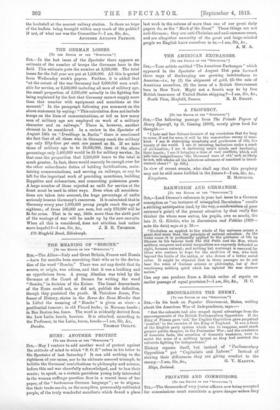THE GERMAN LOSSES.
[TO THE EDITOR OP TRH " SIINTAT011.1 SIR,—In the last issue of the Spectator there appears an estimate of the number of troops the Germans have in the field. This estimate puts the number at 3,200,000. The total losses for the full year are put at 1,500,000. All this is quoted from Wednesday week's papers. Further, it is added that "at the outset of the war Germany had 8,000,000 men avail- able for service, or'9,500,000 including all men of military age, the small proportion of 3,200,000 actually in the fighting line being explained by the fact that Germany cannot supply more than that number with equipment and munitions at the moment." In the paragraph following you comment on the above statement by saying: " This calculation does not include troops on the lines of communications, or tell us how many men of military age are employed on work of a military character and on railways." There is, however, another element to be considered. In a review in the Spectator of August 14th on "Dwellings in Berlin" there is mentioned the fact that of all those who in Germany reach the military age only fifty-four per oent, are passed as fit. If we take those of military age to be 10,000,000, then at the above percentage only 5,400,000 would he fit for military service. In that case the proportion that 3,200,000 //ease to the total is much greater. In fact, there would scarcely be enough over for the other subordinate duties of holding fortifications, main- taining communications, and serving on railways, or any be left for the important work of providing munitions, building Zeppelins and submarines, and concocting poisonous gases. A large number of those rejected as unfit for service at the front must be used in other ways. Even when all considera- tions are taken into account, the huge percentage of unfits seriously lessens Germany's resources. It is calculated that in Germany every year 1,000,000 young people reach the age of eighteen; of these 500,000 are men, but only 270,000 will be fit for arms. That is to say, little more than the sixth part of the wastage of war will be made up by the new recruits. When all this is considered, does not attrition look rather
more hopeful P—I am, Sir, &c., J. E. H. Tstolison. 170 Mayfield Road, Edinburgh.


































 Previous page
Previous page